formerly eScholarship Editions


|
|
|
|
Your search for
'Health Care' in subject
found 9 book(s). | Modify Search | Displaying 1 - 9 of 9 book(s) | |
| 1. | 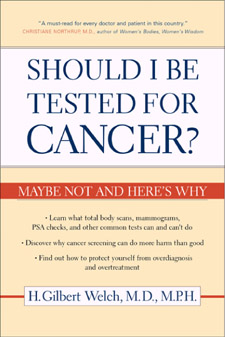 | Title: Should I be tested for cancer?: maybe not and here's why Author: Welch, H. Gilbert Published: University of California Press, 2004 Subjects: Medicine | Health Care | Disease Publisher's Description: Getting tested to detect cancer early is one of the best ways to stay healthy - or is it? In this lively, carefully researched book, a nationally recognized expert on early cancer detection challenges one of medicine's most widely accepted beliefs: that the best defense against cancer is to always try to catch it early. Read this book and you will think twice about common cancer screening tests such as total body scans, mammograms, and prostate-specific antigen (PSA) tests. Combining patient stories and solid data on common cancers, Dr. H. Gilbert Welch makes the case that testing healthy people for cancer is really a double-edged sword: while these tests may help, they often have surprisingly little effect and are sometimes even harmful. Bringing together a body of little-known medical research in an engaging and accessible style, he discusses in detail the pitfalls of screening tests, showing how they can miss some cancers, how they can lead to invasive, unnecessary treatments, and how they can distract doctors from other important issues. Welch's conclusions are powerful, counterintuitive, and disturbing: the early detection of cancer does not always save lives, it can be hard to know who really has early cancer, and there are some cancers better left undiscovered. Should I Be Tested for Cancer? is the only book to clearly and simply lay out the pros and cons of cancer testing for the general public. It is indispensable reading for the millions of Americans who repeatedly face screening tests and who want to make better-informed decisions about their own health care. [brief] Similar Items |
| 2. | 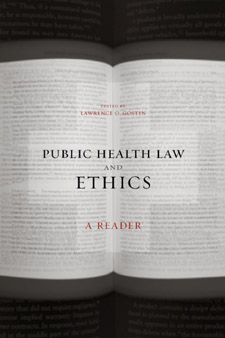 | Title: Public health law and ethics: a reader Author: Gostin, Larry O. (Larry Ogalthorpe) Published: University of California Press, 2002 Subjects: Law | Medicine | Health Care Publisher's Description: This incisive selection of government reports, scholarly articles, and court cases is designed to illuminate the ethical, legal, and political issues in the theory and practice of public health. A companion to the internationally acclaimed Public Health Law: Power, Duty, Restraint, this collection encourages debate and discourse about how courts, scholars, and policy makers respond to the salient legal and ethical dilemmas. The excerpts and commentaries in the reader analyze the legal and constitutional foundations of public health, juxtaposing them with the emerging importance of public health ethics and human rights. The book offers a systematic account of public health law, ethics, and human rights in promoting the common good. Gostin provides thoughtful commentary on the field of public health and carefully explains the meaning and importance of each selection. Scholars, legislators, and public health professionals, as well as faculty and students in schools of law, public health, medicine, nursing, government, and health administration, will benefit from the contemporary case studies covering a wide range of topics from bioterrorism to public health genetics. [brief] Similar Items |
| 3. | 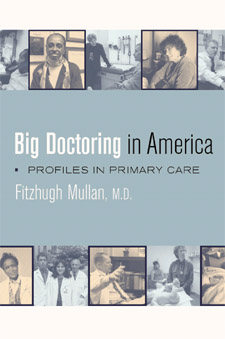 | Title: Big doctoring in America: profiles in primary care Author: Mullan, Fitzhugh Published: University of California Press, 2002 Subjects: Medicine | Health Care | Sociology Publisher's Description: The general practitioner was once America's doctor. The GP delivered babies, removed gallbladders, and sat by the bedsides of the dying. But as the twentieth century progressed, the pattern of medical care in the United States changed dramatically. By the 1960s, the GP was almost extinct. The later part of the twentieth century, however, saw a rebirth of the idea of the GP in the form of primary care practitioners. In this engrossing collection of oral histories and provocative essays about the past and future of generalism in health care, Fitzhugh Mullan - a pediatrician, writer, and historian - argues that primary care is a fascinating, important, and still endangered calling. In conveying the personal voices of primary care practitioners, Mullan sheds light on the political and economic contradictions that confront American medicine. Mullan interviewed dozens of primary care practitioners - family physicians, internists, pediatricians, nurse practitioners, and physician assistants - asking them about their lives and their work. He explains how, during the last forty years, the primary care movement has emerged built on the principles of "big doctoring"--coordinated, comprehensive care over time. This book is essential reading for understanding core issues of the current health care dilemma. As our country struggles with managed care, market reforms, and cost containment strategies in medicine, Big Doctoring in America provides an engrossing and illuminating look at those in the trenches of the profession. [brief] Similar Items |
| 4. | 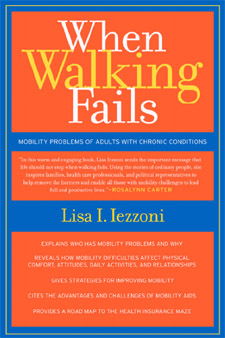 | Title: When walking fails: mobility problems of adults with chronic conditions Author: Iezzoni, Lisa I Published: University of California Press, 2003 Subjects: Medicine | Health Care | Sociology | Public Policy Publisher's Description: Roughly one in ten adult Americans find their walking slowed by progressive chronic conditions like arthritis, back problems, heart and lung diseases, and diabetes. In this passionate and deeply informed book, Lisa I. Iezzoni describes the personal experiences of and societal responses to adults whose mobility makes it difficult for them to live as they wish - partly because of physical and emotional conditions and partly because of persisting societal and environmental barriers. Basing her conclusions on personal experience, a wealth of survey data, and extensive interviews with dozens of people from a wide social spectrum, Iezzoni explains who has mobility problems and why; how mobility difficulties affect people's physical comfort, attitudes, daily activities, and relationships with family and friends throughout their communities; strategies for improving mobility; and how the health care system addresses mobility difficulties, providing and financing services and assistive technologies. Iezzoni claims that, although strategies exist to improve mobility, many people do not know where to turn for advice. She addresses the need to inform policymakers about areas where changes will better accommodate people with difficulty walking. This straightforward and engaging narrative clearly demonstrates that improving people's ability to move freely and independently will enhance overall health and quality of life, not only for these persons, but also for society as a whole. [brief] Similar Items |
| 5. |  | Title: Deceit and denial: the deadly politics of industrial pollution Author: Markowitz, Gerald E Published: University of California Press, 2002 Subjects: Medicine | Health Care | Public Policy | United States History Publisher's Description: Deceit and Denial details the attempts by the chemical and lead industries to deceive Americans about the dangers that their deadly products present to workers, the public, and consumers. Gerald Markowitz and David Rosner pursued evidence steadily and relentlessly, interviewed the important players, investigated untapped sources, and uncovered a bruising story of cynical and cruel disregard for health and human rights. This resulting exposé is full of startling revelations, provocative arguments, and disturbing conclusions--all based on remarkable research and information gleaned from secret industry documents. This book reveals for the first time the public relations campaign that the lead industry undertook to convince Americans to use its deadly product to paint walls, toys, furniture, and other objects in America's homes, despite a wealth of information that children were at risk for serious brain damage and death from ingesting this poison. This book highlights the immediate dangers ordinary citizens face because of the relentless failure of industrial polluters to warn, inform, and protect their workers and neighbors. It offers a historical analysis of how corporate control over scientific research has undermined the process of proving the links between toxic chemicals and disease. The authors also describe the wisdom, courage, and determination of workers and community members who continue to voice their concerns in spite of vicious opposition. Readable, pathbreaking, and revelatory, Deceit and Denial provides crucial answers to questions of dangerous environmental degradation, escalating corporate greed, and governmental disregard for its citizens' safety and health. [brief] Similar Items |
| 6. | 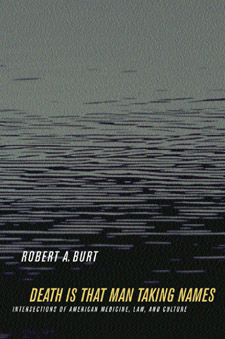 | Title: Death is that man taking names: intersections of American medicine, law, and culture Author: Burt, Robert 1939- Published: University of California Press, 2002 Subjects: Law | Health Care | History of Medicine | Ethics | Religion Publisher's Description: The American culture of death changed radically in the 1970s. For terminal illnesses, hidden decisions by physicians were rejected in favor of rational self-control by patients asserting their "right to die" - initially by refusing medical treatment and more recently by physician-assisted suicide. This new claim rested on two seemingly irrefutable propositions: first, that death can be a positive good for individuals whose suffering has become intolerable; and second, that death is an inevitable and therefore morally neutral biological event. Death Is That Man Taking Names suggests, however, that a contrary attitude persists in our culture - that death is inherently evil, not just in practical but also in moral terms. The new ethos of rational self-control cannot refute but can only unsuccessfully try to suppress this contrary attitude. The inevitable failure of this suppressive effort provokes ambivalence and clouds rational judgment in many people's minds and paradoxically leads to inflictions of terrible suffering on terminally ill people. Judicial reforms in the 1970s of abortion and capital punishment were driven by similarly high valuations of rationality and public decision-making - rejecting physician control over abortion in favor of individual self-control by pregnant women and subjecting unsupervised jury decisions for capital punishment to supposed rationally guided supervision by judges. These reforms also attempt to suppress persistently ambivalent attitudes toward death, and are therefore prone to inflicting unjustified suffering on pregnant women and death-sentenced prisoners. In this profound and subtle account of psychological and social forces underlying American cultural attitudes toward death, Robert A. Burt maintains that unacknowledged ambivalence is likely to undermine the beneficent goals of post-1970s reforms and harm the very people these changes were intended to help. [brief] Similar Items |
| 7. | 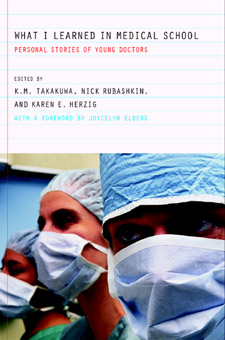 | Title: What I learned in medical school: personal stories of young doctors Author: Takakuwa, Kevin M Published: University of California Press, 2004 Subjects: Medicine | Sociology | Ethnic Studies | Gender Studies | Anthropology | Health Care Publisher's Description: Like many an exclusive club, the medical profession subjects its prospective members to rigorous indoctrination: medical students are overloaded with work, deprived of sleep and normal human contact, drilled and tested and scheduled down to the last minute. Difficult as the regimen may be, for those who don't fit the traditional mold - white, male, middle-to-upper class, and heterosexual - medical school can be that much more harrowing. This riveting book tells the tales of a new generation of medical students - students whose varied backgrounds are far from traditional. Their stories will forever alter the way we see tomorrow's doctors. In these pages, a black teenage mother overcomes seemingly insurmountable odds, an observant Muslim dons the hijab during training, an alcoholic hides her addiction. We hear the stories of an Asian refugee, a Mexican immigrant, a closeted Christian, an oversized woman - these once unlikely students are among those who describe their medical school experiences with uncommon candor, giving a close-up look at the inflexible curriculum, the pervasive competitive culture, and the daunting obstacles that come with being "different" in medical school. Their tales of courage are by turns poignant, amusing, eye-opening - and altogether unforgettable. [brief] Similar Items |
| 8. | 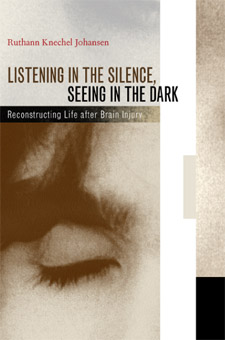 | Title: Listening in the silence, seeing in the dark: reconstructing life after brain injury Author: Johansen, Ruthann Knechel 1942- Published: University of California Press, 2002 Subjects: Medicine | Health Care | Autobiographies and Biographies | Medical Anthropology | Psychiatry Publisher's Description: Traumatic brain injury can interrupt without warning the life story that any one of us is in the midst of creating. When the author's fifteen-year-old son survives a terrible car crash in spite of massive trauma to his brain, she and her family know only that his story has not ended. Their efforts, Erik's own efforts, and those of everyone who helps bring him from deep coma to new life make up a moving and inspiring story for us all, one that invites us to reconsider the very nature of "self" and selfhood. Ruthann Knechel Johansen, who teaches literature and narrative theory, is a particularly eloquent witness to the silent space in which her son, confronted with life-shattering injury and surrounded by conflicting narratives about his viability, is somehow reborn. She describes the time of crisis and medical intervention as an hour-by-hour struggle to communicate with the medical world on the one hand and the everyday world of family and friends on the other. None of them knows how much, or even whether, they can communicate with the wounded child who is lost from himself and everything he knew. Through this experience of utter disintegration, Johansen comes to realize that self-identity is molded and sustained by stories. As Erik regains movement and consciousness, his parents, younger sister, doctors, therapists, educators, and friends all contribute to a web of language and narrative that gradually enables his body, mind, and feelings to make sense of their reacquired functions. Like those who know and love him, the young man feels intense grief and anger for the loss of the self he was before the accident, yet he is the first to see continuity where they see only change. The story is breathtaking, because we become involved in the pain and suspense and faith that accompany every birth. Medical and rehabilitation professionals, social workers, psychotherapists, students of narrative, and anyone who has faced life's trauma will find hope in this meditation on selfhood: out of the shambles of profound brain injury and coma can arise fruitful lives and deepened relationships. Keywords: narrative; selfhood; therapy; traumatic brain injury; healing; spirituality; family crisis; children [brief] Similar Items |
| 9. | 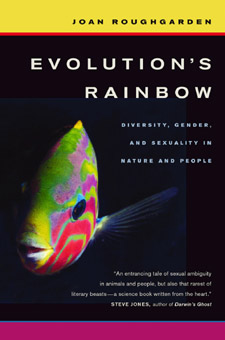 | Title: Evolution's rainbow: diversity, gender, and sexuality in nature and people Author: Roughgarden, Joan Published: University of California Press, 2004 Subjects: Gender Studies | EcologyEvolutionEnvironment | Anthropology | Evolution | Health Care | Social Problems | GayLesbian and Bisexual Studies | Social Problems Publisher's Description: In this innovative celebration of diversity and affirmation of individuality in animals and humans, Joan Roughgarden challenges accepted wisdom about gender identity and sexual orientation. A distinguished evolutionary biologist, Roughgarden takes on the medical establishment, the Bible, social science - and even Darwin himself. She leads the reader through a fascinating discussion of diversity in gender and sexuality among fish, reptiles, amphibians, birds, and mammals, including primates. Evolution's Rainbow explains how this diversity develops from the action of genes and hormones and how people come to differ from each other in all aspects of body and behavior. Roughgarden reconstructs primary science in light of feminist, gay, and transgender criticism and redefines our understanding of sex, gender, and sexuality. Witty, playful, and daring, this book will revolutionize our understanding of sexuality. Roughgarden argues that principal elements of Darwinian sexual selection theory are false and suggests a new theory that emphasizes social inclusion and control of access to resources and mating opportunity. She disputes a range of scientific and medical concepts, including Wilson's genetic determinism of behavior, evolutionary psychology, the existence of a gay gene, the role of parenting in determining gender identity, and Dawkins's "selfish gene" as the driver of natural selection. She dares social science to respect the agency and rationality of diverse people; shows that many cultures across the world and throughout history accommodate people we label today as lesbian, gay, and transgendered; and calls on the Christian religion to acknowledge the Bible's many passages endorsing diversity in gender and sexuality. Evolution's Rainbow concludes with bold recommendations for improving education in biology, psychology, and medicine; for democratizing genetic engineering and medical practice; and for building a public monument to affirm diversity as one of our nation's defining principles. [brief] Similar Items |